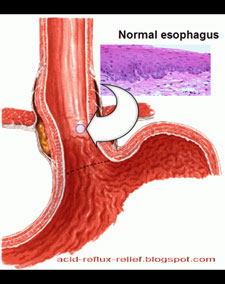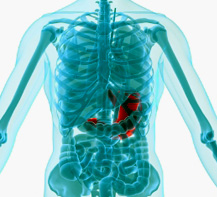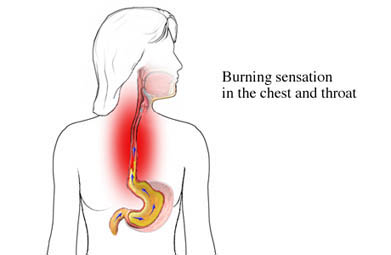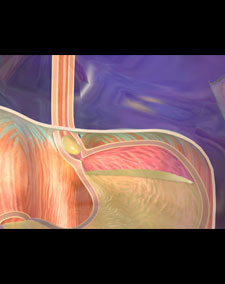|
What is
Acid
Reflux ?
Is a chronic condition in which liquid
content of the stomach leak back (reflux) into the esophagus. The
abnormally refluxed gastric contents usually contains acid. When
this refluxed gastric acid touches the lining of esophagus, it
causes heartburn, a burning sensation in the chest or throat .
Acid reflux disease symptoms include chronic heartburn symptoms.
Articles in this section provide more information on what causes
Acid Reflux, the symptoms of Acid Reflux, prevention and treatment
on GERD.
Infant Acid Reflux:
Treatment for Acid Reflux in Babies
Acid reflux or gastroesophageal reflux, is a common problem among
infants that is characterized by spitting up or expulsion of the
stomach content, during or just after feeding. The problem is
usually prevalent in the early months of life and then slowly
subsides between the 6th and the 12 month. For the majority of the
babies, acid reflux does not cause much trouble, as babies may not
experience any other problem except spitting. In such a situation,
no treatment is required, and slight modifications in eating
habits and lifestyle can considerably control the situation. But
sometimes, it can lead to certain serious conditions that can
cause other health problems.
Causes and Symptoms of Acid Reflux in
Babies
Acid reflux is usually a result of poor coordination of the
gastrointestinal tract, where acid and abdominal content flow back
into the esophagus. The esophagus is a muscular tube that is
responsible for connecting the throat to the stomach. A tough
muscle of the esophagus, known as esophageal sphincter, allows
food to move out of the esophagus to the stomach and at the same
time prevents any reverse flow. Therefore, acid reflux can be
caused by the malfunctioning or immaturity of this muscle. In
addition to this, dietary habits like overfeeding or underfeeding,
can cause indigestion and acid reflux in infants.
Treatment for Acid Reflux in Babies
Most of the time, acid reflux does not require any treatment, as
it usually subsides on its own with age. But you can also control
the situation by making certain changes in the lifestyle and
dietary habits. You should avoid underfeeding or overfeeding your
baby. Instead, babies should be given frequent, small meals. It is
also important to feed your baby in the right position. They
should be held in an upright position during feeding and also for
half an hour after feeding. Thickening the formula and burping
your baby several times during feeding, can be helpful in
relieving the symptoms of acid reflux.
If you are breastfeeding your baby, then it is important to avoid
or reduce the amount of certain foods like chocolate, garlic and
caffeine, as they are believed to have reflux promoting effects.
The sleeping position can also play a significant role, as
sleeping in a slightly elevated position can help keep the food
and acid in the stomach and thereby prevent reflux during
nighttime.
However, if all these measures fail to bring relief to your child
and there is ground to believe that acid reflux is affecting your
babies normal rate of growth and development, then you should
better consult your physician for a proper treatment. The
physician may evaluate the symptoms and perform some physical
tests to diagnose the disease. For treating acid reflux in babies,
they may prescribe acid blockers, also known as H2 blockers, and
acid suppressors like proton pump inhibitors to block the
production of acid in the stomach, in addition to changes in the
lifestyle and feeding habits. In severe cases of infant acid
reflux, surgery may be an important treatment option to tighten
the esophageal sphincter in order to prevent reflux.
Sometimes acid reflux can lead to certain serious conditions like
poor growth, spitting blood and esophageal damage. Therefore, it
is very important to regularly monitor the symptoms and seek the
advice of an experienced physician for treating acid reflux in
babies.
causes of
Acid Reflux Disease
The word reflux is derived from
the Latin word refluere, meaning to move back or retreat. Acid
reflux can be caused due to a variety of reasons. Erratic eating
habits is the main cause for acid reflux. Frequently having spicy
or fried food and heavy meals cause acid reflux. Coffee and citrus
fruits worsen this disorder. It is also observed in case of
pregnancy and peptic ulcers. Smoking and alcoholism is also a
cause of acid reflux. Irregular lifestyle in an individual is also
one of the main cause responsible for this disorder. Now that the
prominent causes are known, let us have a look at the symptoms of
acid reflux disease.
Symptoms of Acid Reflux Disease
Regurgitation: It is the most frequently observed symptom of acid
reflux. Due to the malfunctioning of the esophageal sphincter, the
contents in the stomach come back to the mouth. The person may
experience bitter and sour taste in the mouth after meals.
Heartburn: Heartburn is the one of the most common symptom of acid
reflux disease. A person feels a burning sensation in the lower
chest. Some people relate heart burn with heart attack. But one
must remember that they are not related. Heartburn is related to
acid reflux.
Dysphagia: Dysphagia, or difficulty in swallowing is also
observed. A person may get the sensation that something is stuck
inside his esophagus, and hence discomfort is experienced. He may
even feel loss of appetite.
Dyspepsia: It is a disorder of digestive function causing nausea
or heartburn. It is commonly experienced by people having acid
reflux disease.
Vomiting and Nausea: As the acid from the stomach comes back to
the throat, the person feels nauseous. Sometimes, particles of
food may also flow back to the mouth resulting in vomiting.
Though, vomiting due to acid reflux is not a common symptom.
Apart from these major indications, symptoms of acid reflux
disease also include burping, hoarseness, feeling of bloating and
discomfort. Symptoms of acid reflux in infants, are also observed.
Acid reflux disease is not a very severe or dangerous disease. It
is a common disorder experienced by most people. But this does not
mean that one must ignore the symptoms. Constant irritation caused
due to frequent acid reflux results in GERD (Gastrophageal Reflux
Disease), and it is chronic. GERD is also one of the causes of
esophageal cancer.
The best precaution that you can take to control or avoid acid
reflux is have a healthy and balanced diet. Do not have irregular
and heavy meals. People who have a control on their appetite
seldom suffer from acid reflux disease. You must also reduce
intake of extremely spicy food, especially at night. Changing your
lifestyle is advisable if you persistently suffer from acid
reflux. As medication, acid suppressants and antacids are
available which can treat acid reflux. But medications have to be
strictly taken under the supervision and advice of a physician.
Natural treatments for acid reflux are also available.
Signs
and tests
You may not need any tests if your symptoms are not severe.
If your symptoms are severe or they come back after you have been
treated, one or more tests may help diagnose reflux or any
complications:
• Esophagogastroduodenoscopy (EGD) is often used to identify the
cause and examine the esophagus (swallowing tube) for damage. The
doctor inserts a thin tube with a camera on the end through your
mouth. The tube is then passed into your esophagus, stomach, and
small intestine.
• Barium swallow
• Continuous esophageal pH monitoring
• Esophageal manometry
A positive stool occult blood test may diagnose bleeding from the
irritation in the esophagus.
Acid Reflux
Diet: Safe Foods to Eat with Acid Reflux
Acid reflux, commonly known as
heartburn is the condition when the acid created by the stomach
regurgitates into the upper parts of intestine and the esophagus.
This is due to malfunctioning of the sphincter muscle of
esophagus, which fails to close, allowing the contents to re-
enter esophagus. Though the cause of acid reflux can be highly
attributed to eating large proportions of meals, there are several
other factors which contribute to this disorder. Some of them are
hiatal hernia, peptic ulcers, insufficient digestive enzymes,
pregnancy (a temporary cause), unhealthy lifestyle etc.
Since, acid reflux is not a serious disorder, the discomfort
associated with it can hamper the quality of life of the patient.
A little medication and proper diet and exercises can easily
control this disorder. Safe foods for acid reflux can be best
identified by the patient himself by maintaining a diet diary and
recording what sort of foodstuffs work for him.
Safe Foods to Eat with Acid Reflux
However, there are certain foods that can be consumed by the acid
reflux patients without any trouble. Here is the list of safe
foods to eat:
Fruits
Not all the fruits can go well with heart-burn. Citrus fruits
should be exclusively avoided. Fruits like berries can be consumed
in moderation. Also other acidic fruits like tomato should not be
consumed in any form. The fruits that can be safely consumed are:
* Apple (fresh, dried, juice)
* Bananas
Vegetables
Vegetables should be cooked in very little oil. Also certain
vegetables like onion should not be eaten raw. Potato can be
consumed only when baked. Other safe vegetables include:
* Green Peas
* Cabbage
* Broccoli
* Baked Potato
* Green beans
* Carrots
Meat
All types of meat can be safely consumed, provided they are
rightly cooked. Cooking in little oil or steamed, is the best way
to consume meat. Safe forms of meat include:
* Ground Beef (extra lean)
* Steak
* Chicken (skinless)
* Fish (no added fat)
* Egg White
* Egg substitutes
Dairy
Only low-fat or fat-free versions of dairy products are safe to
consume.
* Cheese (feta or goat)
* Cream cheese (fat-free)
* Sour cream (fat-free)
* Soy cheese (low-fat)
Grains
Certain food grains can provide fiber supplements for acid reflux.
Low fat, high carbohydrate grains are safe for acid reflux.
* Bread (multi-grain or white )
* Cereal (bran or oatmeal)
* Corn bread
* Graham crackers
* Pretzels
* Rice (brown or white)
* Rice cakes
Beverages
It is a common myth that drinking milk is the quick fix for acid
reflux disorder. But the fact is, drinking milk can aggravate the
problem, especially at night. Also, alcoholic beverages like beer
can trigger the production of acid in stomach. Caffeine beverages
or aerated drinks are not at all advisable for acid reflux. Hence
the only safe beverage for acid reflux is:
* Mineral water
Fats and Oils
Fats and oils are to be strictly avoided by the people suffering
from acid reflux. The only recommended form of consumption of fats
and oils is:
* Salad dressing (low fat)
Sweets
Sweets that can be consumed without a problem are:
* Jelly Beans
* Red Licorice
* Cookie (fat-free)
Though the above mentioned foods can constitute the safe diet for
acid reflux, they should never be consumed in large proportions.
Having 5-6 small meals a day will be a good option for people
suffering from acid reflux. Also, they should try and maintain an
erect posture for at least 45 minutes after meal. Positioning head
at the height above rest of the body while sleeping reduces the
occurrence of acid reflux.
|








